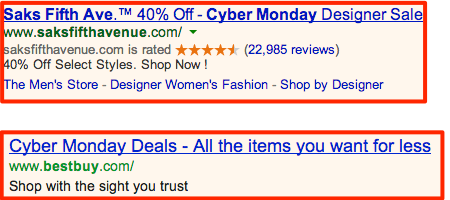Online merchants were promoting deals in full force earlier this week, leading to a record high for Cyber Monday sales. That uptick should provide many eCommerce companies with a significant holiday boost. But at the same time, the increase in demand carried some questionable (and potentially costly) affiliate behavior with it.
After all, Cyber Monday is probably the busiest eCommerce day during the busiest time of the year for eCommerce. The high volume of sales—fueled by deep discounts—creates an incentive for affiliates to employ non-compliant tactics. A blackhat affiliate stands to gain quite a bit if they can work their way into just a tiny fraction of those abundant sales. And in some of our investigatory Cyber Monday monitoring, that's exactly what we found.
Ad Hijackers Latch onto the Deal Buzz
Both of these are ad hijacks, meaning they go through affiliate links before redirecting to their respective merchants' websites. And both attempt to garner clicks by promoting Cyber Monday offers. The first, targeting Saks Fifth Avenue, produces a rather convincing ad that's indistinguishable from the merchant's regular ads. The affiliate quotes the actual discount percentage offered by Saks on its landing page, includes an ad extension at the bottom of their ad, and even uses the trademark symbol to make the ad look more official. The result is an ad that's not only enticing to click on, but also difficult for an affiliate manager to catch.
Alternatively, the Best Buy hijacker presents us with a more suspicious-looking ad. The brand name is not displayed prominently. The ad is missing punctuation. "Sight" is incorrectly used instead of "site". It would certainly raise some red flags if it were seen by an affiliate manager or PPC marketer. However, the likelihood of searchers clicking on the ad is less certain. It's possible that they might pick up on the same red flags—but would they be paying as close attention as marketers?
Regardless of how enticing each of these ads is to the user, it's clear that the affiliates behind them are specifically targeting Cyber Monday as a hijacking opportunity. Considering that Cyber Monday only lasts a single day, it must carry some significant financial potential if affiliates can justify making ads especially for it (as opposed to engaging in run-of-the-mill hijacking). The high volume of sales probably has a lot to do with that. Not only are there more opportunities to hijack, but it might also be easier for affiliate hijackers to hide.
Coupon Sites Grab a Piece of the Pie
Aside from the hijackers, we also found some interesting ads placed by coupon sites. While there are certainly some legitimate ways for coupon sites to help promote brands on Cyber Monday, the methods we found were questionable at the very least. For example, take the ad at the right for promopanther.com.
This ad does very little to indicate that it will take the user to a coupon site. There is no mention of "coupon" or "promo code" in the ad copy. Outside of the curious display URL, the ad doesn't even mention where it will take the visitor. Instead, the advertiser seems rather interested in keeping these details vague—perhaps with the hope that the words "Cyber Monday Lowes" will entice the user to click. And strangely enough, if one does click on this ad, one simply ends up on promopanther.com's homepage. There's no landing page specific to Lowe's. In fact, upon further investigation, it's unclear whether there were ever any Lowe's deals posted on the site at all.
Let's look at another example from the site CouponClickClub.com. This ad does a similar job of being vague and avoiding coupon-related terminology. Furthermore, it even takes things a step further by mentioning "Free Shipping" at the end of the ad. Why would a coupon site promote free shipping? Have you ever seen a non-merchant promoting free shipping before? There's the outside chance of a coupon that grants free shipping—but no such coupon exists on the ad's landing page. Instead, CouponClickClub seems intent on imitating NoMoreRack in order to boost its traffic.
Does Cyber Monday Demand Its Own Set of Affiliate Rules?
Are merchants' standard affiliate agreements enough to cover Cyber Monday? Sure, our hijack examples could have been prevented with the use of negative keywords on brand terms. But should affiliates be allowed to directly link to merchants' sites on keywords like "Cyber Monday" or "Cyber Monday deals"?
Furthermore, what role should coupon sites play in merchants' Cyber Monday promotions? If a merchant is offering sitewide discounts, does it make sense for a coupon site to advertise the promotion on the merchant's branded keywords? As Cyber Monday continues to grow, it will be interesting to see how compliance evolves with it.



